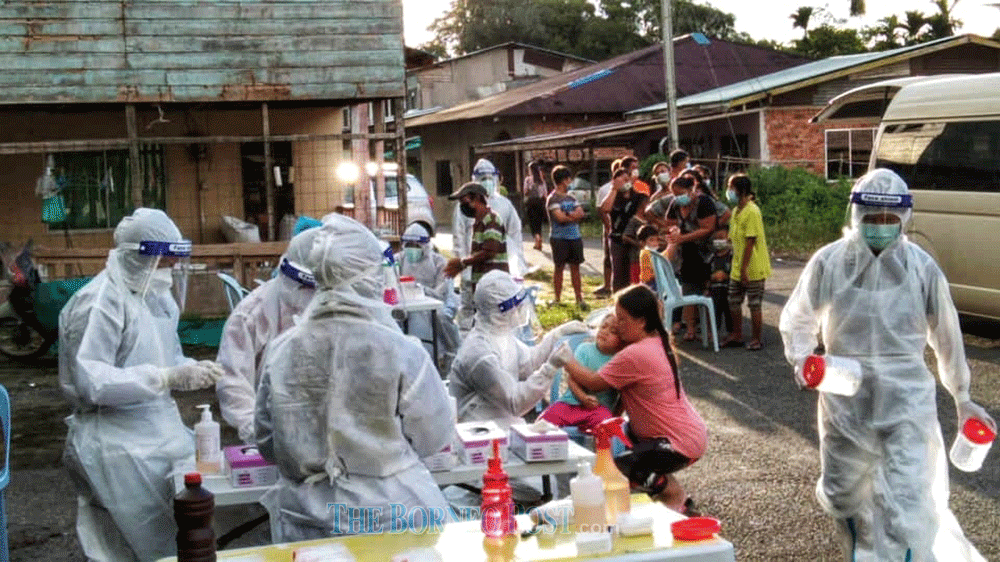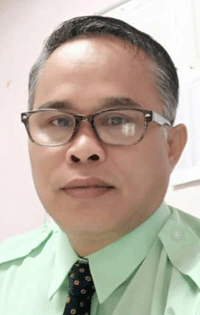
A Covid-19 swab team in the thick of action carrying out sampling at a longhouse in Sibu.
MIRI: Being transferred to Miri Hospital from Bintulu Hospital in January this year was like having a weight lifted off the shoulders of Matron Siti Uding, 50, since she joined the frontlines of the war against Covid-19.
Though she now lives alone here, the mother of three feels it is safer for her family as she does not have to worry about the possibility of bringing the virus home with her from work.
“When I was still living with my family in Bintulu, I felt worried when I wanted to hug my children, even after I’d showered and cleaned myself. The feeling is always there.
“But I have to stay positive because I know I have followed all the SOP (standard operating procedures). Furthermore, doing what I do, I need to be strong and positive mentally,” she told The Borneo Post.

Siti Uding
Although Siti misses her family in Bintulu very much, she is committed to her work as she understands that her service is very much needed during the pandemic.
Siti’s youngest child is aged 14, while her other two children are working adults.
“When I was in Bintulu, I felt worried when going back home to my family after a hard day’s work. We understand this pandemic and we do not want to bring home ‘anything bad’ from work.
“I worry especially about my parents, who live with me, because they are elderly and have higher risk,” she said.
During The Borneo Post’s interviews with frontliners like Siti, it was evident that aside from the long hours and the constant fear of contracting the virus, family was what mattered most for them.
There is no doubt that the front-liners are the heroes of our war on the pandemic and for them, isolation from their family and loved ones – whether due to distance or as precaution – has been nothing short of a sacrifice.
Siti works at the Covid-19 Quarantine and Low-Risk Treatment Centre (PKRC) here where for the time being, the patients are her family.
“I see them (patients) like my own family members, especially the elderly ones who are all alone. I feel sorry for them because they are being warded and their family members cannot be with them or take care of them.
“So, while they are under our care, we are their family,” she said, adding that caring for the elderly patients reminded her of her own parents back in Bintulu.

Japswell Kitok
Video calls just not the same
Japswell Kitok, 49, meanwhile, is finally able to be with his family since early this year but their daily routine has changed dramatically.
The assistant medical officer was transferred here from Kuching in 2019 and since the first round of the Movement Control Order (MCO) was imposed last year, his visits home were rare.
“When the pandemic started and the first lockdown was enforced, we could not see each other for more than five months.
“It was so painful for me. I was missing my family very badly, especially my youngest daughter who is 10 years old and has special needs. She is very close to me.
“But I looked at it positively. I live alone in Miri so I don’t have to worry too much about bringing the virus home and infecting my family,” said the father of three.
He said he would talk on the phone and have video calls with his wife and children regularly while being apart, but it was never like being with them in person.
Japswell was happy when his family moved to Miri to be with him recently, but even then things were not quite normal.
“We had to practise the new normal. My youngest daughter would normally come to hug me as soon as I reach home from work, but we cannot do that anymore.
“Before I reach home I have to call my wife to take the children out so that I can come in and straight away shower as well as clean myself.
“Only after that can I hug my youngest daughter and be with my family,” he said
Japswell is attached to the psychiatric unit and is part of a special team set up to provide counselling to patients as well as staff whose lives have been affected by Covid-19.

Faezah Othman
When mum and dad are frontliners
In Sibu, staff nurse Faezah Othman, 31, of the Lanang Health Clinic, helps prepare the materials including personal protective equipment (PPE) required by the Covid-19 swab teams before they are deployed to the field.
She recalled that since the emergence of the Pasai Cluster in January this year, she has isolated herself from the rest of her family members for fear of passing the virus to them.
Faezah said she used to live with her eight-year-old daughter and husband in her parents’ house at Kampung Bahagia Jaya in Sibu.
“But since January and having to go to the field as well as seeing more cases (of Covid-19), I started to think it would be best for me and my husband, who is also a frontliner, to separate ourselves from the rest of the family (for time being).
“Since January, the time we spend with our daughter has been very much reduced as I only get to see her once or twice a week.
“Even then, it would only be for a while as I would just deliver food, which she has asked me to buy for her.
“I talk to her from a distance and do not dare to hug because we’d never know if we carried the virus from the field,” Faezah related, adding that both her husband and her are currently living in Permai Jaya.
She said only after her swab test returns negative would she dare to meet her daughter.
With nine years’ experience under her belt, Faezah said their schedule has been very tight since January.
She admitted that initially, she was scared and mustered strength to carry out her duties.

Dr Raymond See
Family keeps front-liners going
Faezah’s colleague, Dr Raymond See, 34, who leads a Covid-19 swab team, has not seen his parents in Kuala Lumpur for the past one and a half years.
Married with two young children, he admitted that the feeling of missing his family is intense.
“I was supposed to return to Kuala Lumpur to spend Chinese New Year with my parents this year, but I had to forego the plan due to the pandemic as well as the tight work schedule and responsibilities. I have not seen my parents for one and half years.
“But my parents are very supportive and asked me to focus on my work, which is why family support is most important for front-liners in their fight against Covid-19,” said Dr See, the eldest of three siblings.
He admitted that working in the swab team has been challenging as the time spent with family members was significantly reduced due to the amount of time they have to spend on the field.
“During the outbreak in Pasai Siong at that time, every single day, we had to go out around 6am and come back late at night,” he recalled.
He added, “Sometimes, when we reached home, our children wanted to hug us, but we would think twice. You need to bathe first before you could hug them. At times, you can see their reaction as to why daddy and mummy act that way.”

Josephine Chua
Finding strength in being positive
Staff nurse Josephine Chua, 31, can still remember clearly her first night shift at the Covid-19 ward when it was first set up in Miri Hospital.
“That time, everything was very new including the new SOPs and guidelines. We work 12-hour shifts seven days a week and will go off for one week after that. That first night, there was only two of us and we had to really look out for each other.

Rain or shine, members of the Covid-19 swab team are ready to carry out their duties at the Lanang Health Clinic.
“One night, we had more than 10 admissions. We had to explain the SOP to each and every one of them, but some of them could not understand it as these were still very new. We had to repeat ourselves over and over to help them understand why they cannot be near each other, why they cannot cross the red line, and all the other SOPs.
“It was a really crazy night for us that day but when we look back at it today, it reminds us of a new experience that made us better at what we do,” said Chua, who have been serving Miri Hospital for nine years.
Despite working long hours when the pandemic just started, she has managed not to stress herself out and to maintain her positive attitude.
“Every time I feel tired and also stress out, I remind myself that I’m doing all these for the good of society. I always think about the society that I’m helping and this gives me a sense of satisfaction,” she said.
